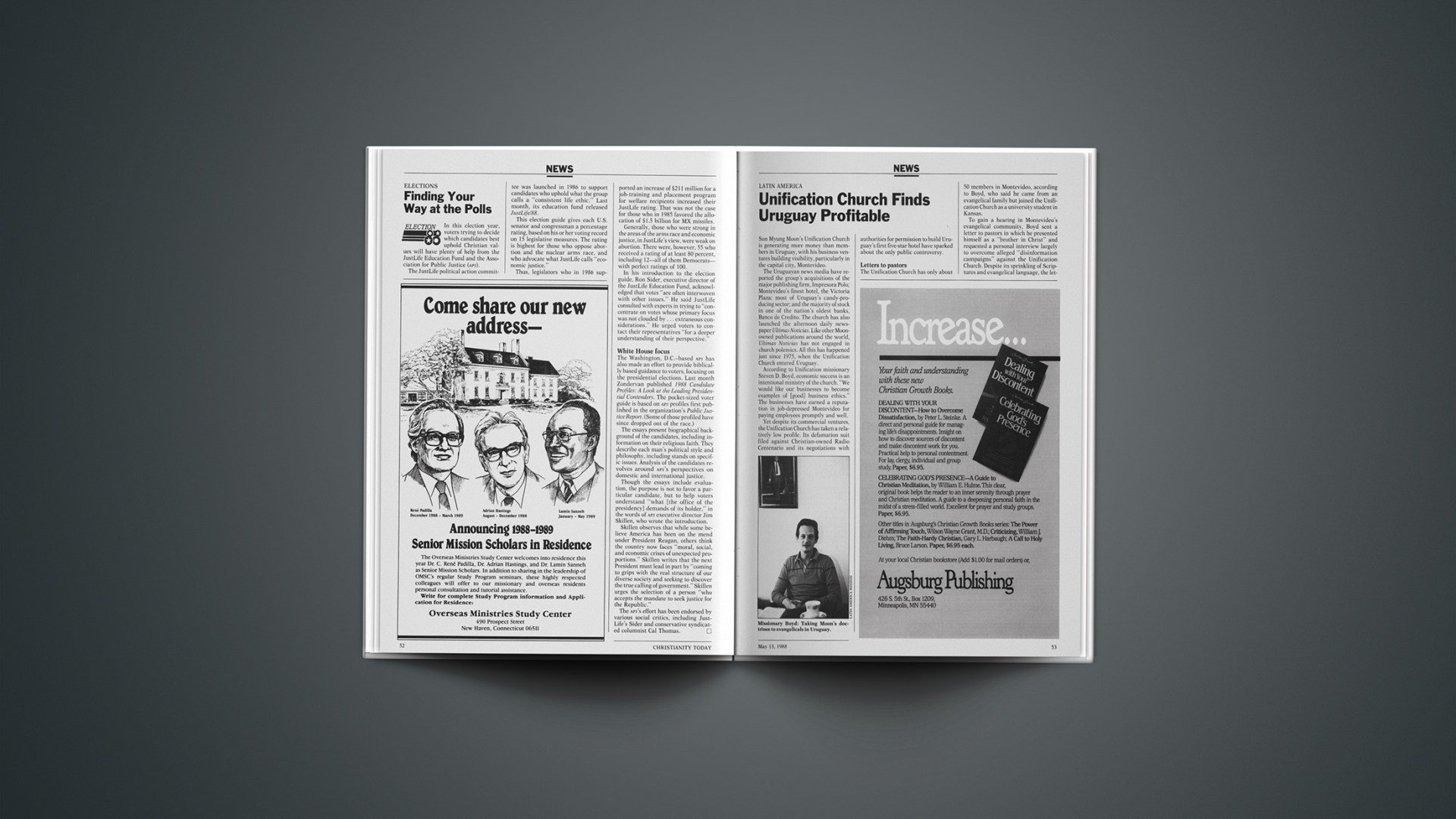latin america
Sun Myung Moon’s Unification Church is generating more money than members in Uruguay, with his business ventures building visibility, particularly in the capital city, Montevideo.
The Uruguayan news media have reported the group’s acquisitions of the major publishing firm, Impresora Polo; Montevideo’s finest hotel, the Victoria Plaza; most of Uruguay’s candy-producing sector; and the majority of stock in one of the nation’s oldest banks, Banco de Credito. The church has also launched the afternoon daily newspaper Ultimas Noticias. Like other Moon-owned publications around the world, Ultimas Noticias has not engaged in church polemics. All this has happened just since 1975, when the Unification Church entered Uruguay.
According to Unification missionary Steven D. Boyd, economic success is an intentional ministry of the church. “We would like our businesses to become examples of [good] business ethics.” The businesses have earned a reputation in job-depressed Montevideo for paying employees promptly and well.
Yet despite its commercial ventures, the Unification Church has taken a relatively low profile. Its defamation suit filed against Christian-owned Radio Centenario and its negotiations with authorities for permission to build Uruguay’s first five-star hotel have sparked about the only public controversy.
Letters To Pastors
The Unification Church has only about 50 members in Montevideo, according to Boyd, who said he came from an evangelical family but joined the Unification Church as a university student in Kansas.
To gain a hearing in Montevideo’s evangelical community, Boyd sent a letter to pastors in which he presented himself as a “brother in Christ” and requested a personal interview largely to overcome alleged “disinformation campaigns” against the Unification Church. Despite its sprinkling of Scriptures and evangelical language, the let-lován, head of the Bible Society of Uruguay and a Baptist pastor, has extensively researched Moon’s teachings. He led a well-attended workshop on “The Missionary Strategy of the Unification Church” at last November’s COMIBAM missions congress in Brazil.
Insights From The Spirit World?
The Unification Church has been rocked internally by recent reports of a Zimbabwean church member who claims to speak for the spirit of Moon’s late son. The Washington Post has reported that Moon accepts the Zimbabwean as the “reincarnated soul” of his son Heung Jin Nim, who was killed at age 17 in a 1984 auto accident.
According to several accounts, the Zimbabwean, whose real name is not known, has visited the U.S., Europe, and Asia preaching and delivering insights from the “spirit world.” The Post reported that the Zimbabwean holds “confessionals,” during which he physically strikes church members.
The Unification Church has maintained it does not believe in reincarnation. Dietrich Seidel of the Unification Seminary in New York portrayed the Zimbabwean’s appearance as “spiritual cooperation without reincarnation,” which he said is consistent with Unification beliefs. In an interview with a representative from the group Jude 3 Missions, which opposes the Unification Church, Seidel said the Zimbabwean “is a brother with his own personality, but he has had his own spiritual connection of oneness with Rev. Moon’s son, and so he receives teaching and spiritual inspiration and guidance, and passes it on to the members.”
Church officials say the Zimbabwean is creating a “revival.” Non-Unificationists with ties to Moon’s business ventures, however, are less enthusiastic. Ron Godwin, a vice-president at the Moon-owned Washington Times and a former Moral Majority executive, told the Post, “From the bottom of my navel, I don’t want to know about this.”
In his COMIBAM presentation, Milován noted that Moon affirms his Divine Principle is based on biblical principles.
“However,” asserted Milován, “any reader with a simple understanding of the Bible will immediately find that it is an eclectic mix of Taoism, Buddhism, Metaphysical Spiritualism, Messianic Christianity, numerology, the occult, and anticommunism.”
Influence In Latin America
Across Latin America, the Unification Church has sought political influence through its organization AULA, the Spanish acronym for Pro-Latin American Unity Association, according to Milován. AULA members include ex-presidents of Latin nations and others who “have had and continue having a great influence on the political map of the continent,” Milován said.”
The Unification Church entered Uruguay in 1975 during the military government’s crackdown on the leftist Tupamaro movement. And Moon’s strong anticommunism and prospective financial investments scored points among Uruguayan leaders of that time. (In 1985, Uruguay returned to an elected, civilian government.)
“My biggest battle [in Uruguay] is just getting people to listen … to get people to realize we’re not a strange group,” said missionary Boyd. So far, he has made little headway.
By John Maust in Uruguay.










